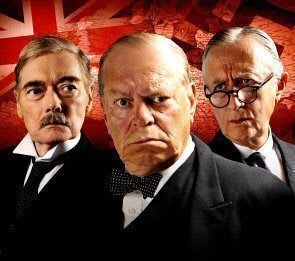What is missing in this political thriller is the thrill. Its very hard to keep tension at a high point and the business of decision-making on a knife edge when everyone already knows the outcome, although Warren Clarke, returning to the stage after several decades of very high profile television crime drama, certainly does his best.
The play opens with the War Cabinet on its knees and praying, as well they might with Britain in the grip of the biggest crisis in a thousand years. It is 1940 - Germany has already annexed Austria, continued persecution of the Jews and invaded Czechoslovakia and Poland. Denmark, taken by surprise, is the next to fall, closely followed by Norway and later Belgium, Luxembourg and Holland. Large numbers of British troops are stranded on the northern coast of France, and America is keeping well out of the way - the situation seems hopeless. The French certainly thought so and General De Gaulle was keen to agree a peace treaty but we now had Churchill as Prime Minister who, for some years, had been warning about the danger Hitler posed. Surrender was not in his vocabulary.
The first act is very long-drawn out as the necessity for the meeting in 10 Downing Street is explained and, simply presented by the five men sitting around a table, becomes a very dry history lesson. James Alper, though, does a splendid job of narrator (and occasional prop. shifter) as Private Secretary Jock Colville, giving the background to the events and introducing each member of the cabinet, later reading extracts from Colvilles diaries which give a little more insight into the character.
The second act becomes more interesting as it proceeds to put a little flesh onto the dry bones of the individual men and shows the divided Cabinet. Churchill, together with Labour Leader Clement Attlee (Michael Sheldon) and his deputy Arthur Greenwood (Dicken Ashworth) are determined to go on fighting, while Robert Demegers ex-prime minster Neville Chamberlain is all for appeasement and willing to accept Hitlers terms so long as they are acceptable. The deposed Chamberlain (wearing what can only be described as a hangdog expression) thinks long and hard about the situation, remembering Hitler reneging on his promises at Munich and, persuaded by a crafty and conciliatory Churchill, finally agrees that the country should fight on alone. It is his consent which is vital, the pivotal moment when our fate was decided, and we get a little more humanity and insight from Robert Demegers interpretation.
Jeremy Clyde also expertly paints a slightly more in-depth picture of Lord Halifax who indignantly believes that appeasement is the only way to go - Hitler should be desperate to make peace with us - but what the play actually builds up to is a accolade to Churchill who, gifted with oratory, and perhaps foresight, led us bravely through the war inspiring with his rhetoric. Clarke has the Churchillian speech and mannerisms absolutely spot on - his belligerent expression when facing up to opposition, his conciliatory manner to get his own way, and a little extract from one of his many speeches, Better to perish than to live as slaves, brought audience approval and applause. History will be kind to me, said Churchill, because I shall write it!
It would be fascinating to discover the truth of what really went on behind closed doors, and there are some little snippets read from Colvilles diaries which give a little insight - supposition, however, is not quite so interesting, but the play is well worth seeing for some excellent performances.
Alex Ramon reviewed this production in Richmond. It was also reviewed by Philip Fisher at Trafalgar Studios.
